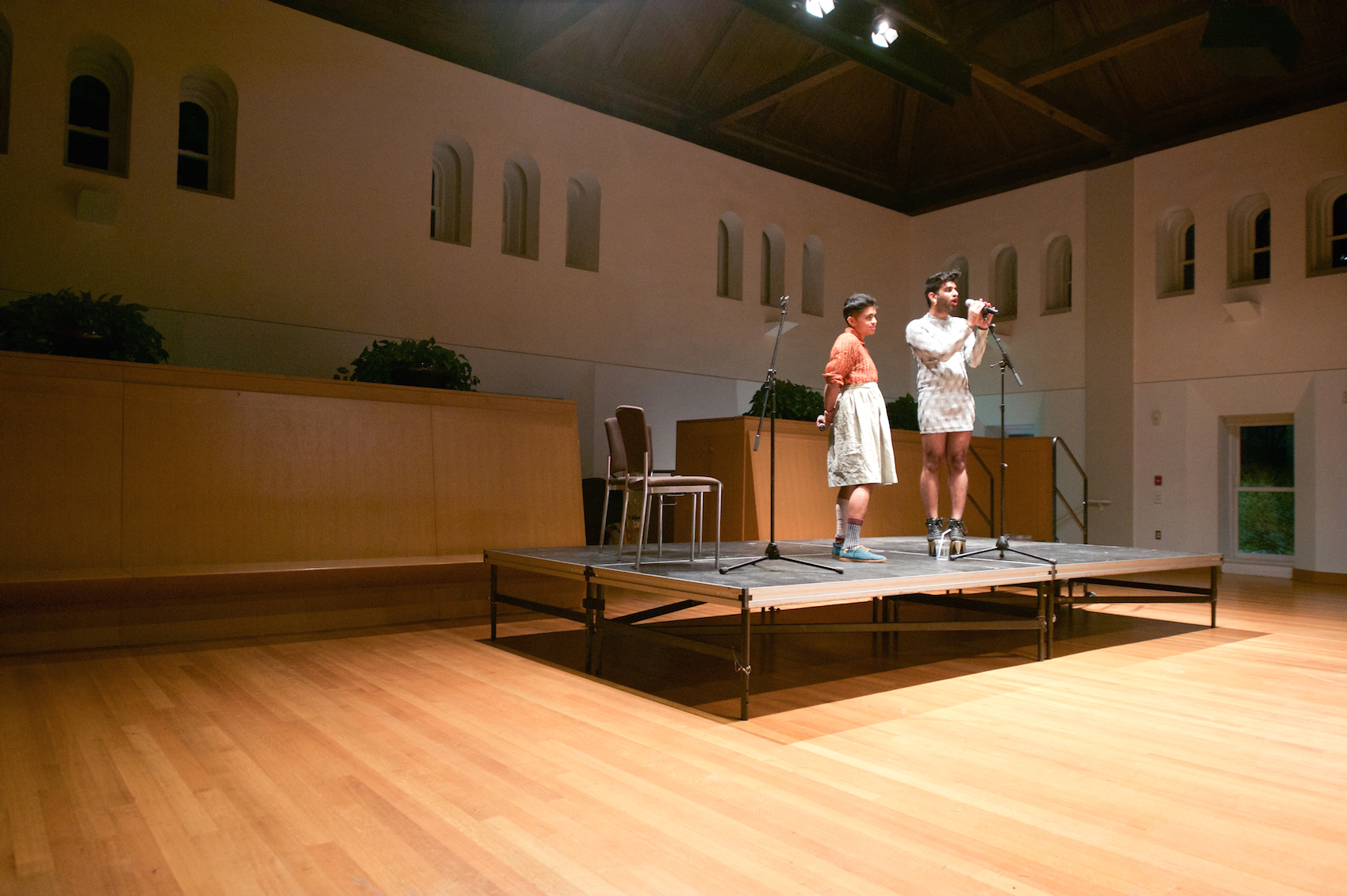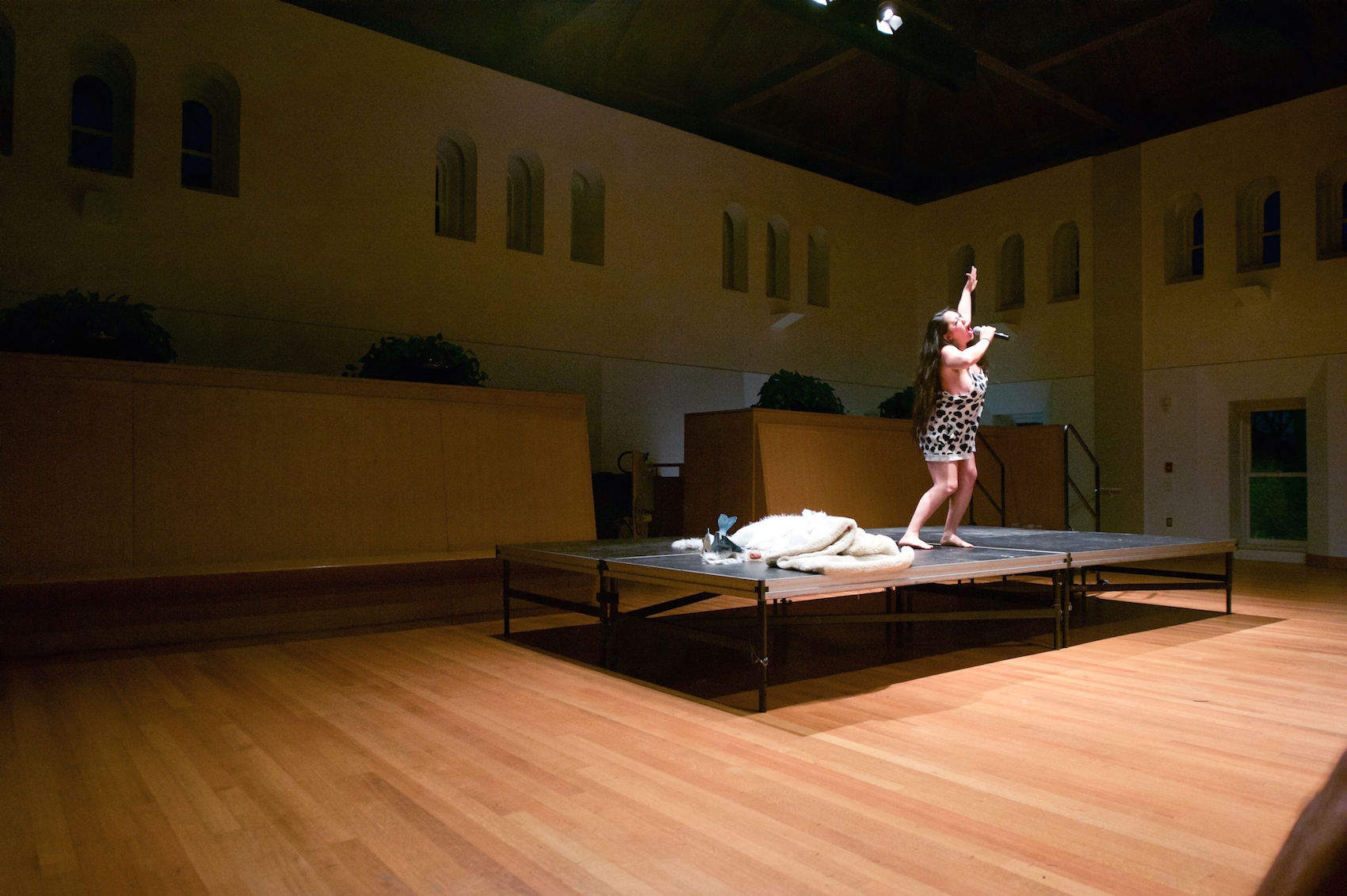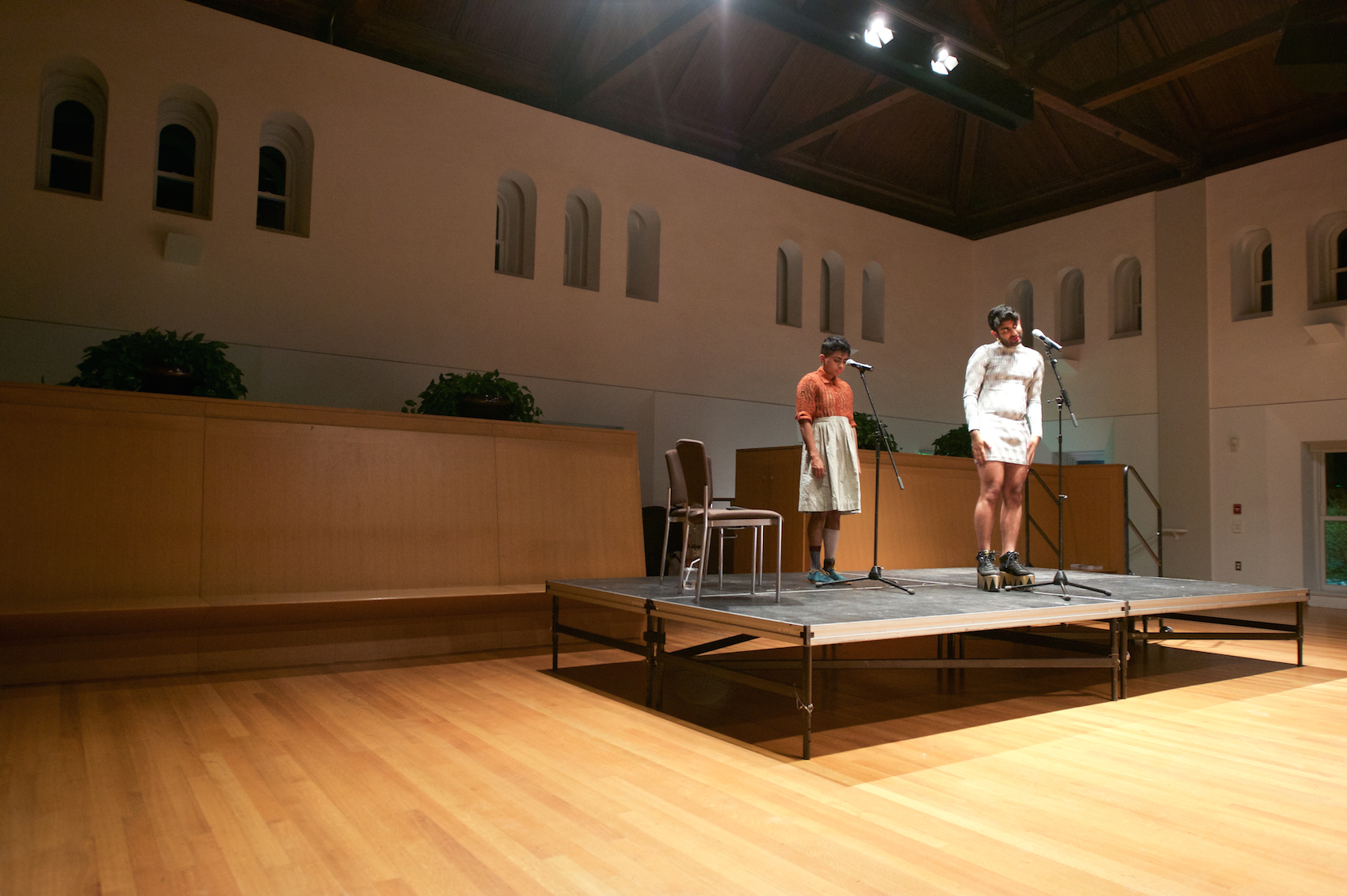This past Tuesday, Shakti and the Wesleyan Asian American Student Collective co-hosted a performance by DarkMatter in Beckham Hall. DarkMatter is a trans South Asian performance art duo composed of Alok Vaid-Menon and Janani Balasubramanian.
Before DarkMatter took the stage, burlesque performer Una Aya Osato ’04 opened with a selection from her one-woman show, “exHOTic other.” As a cheery rendition of “Winter Wonderland” played over the speakers, Osato appeared dressed as a seal, wearing a white faux fur suit, beard, and hood with round white ears.
Rubbing her belly as if in search of food, Osato staggered around the space and used her highly expressive face to comic effect. She then mimed that she was overheating and began disrobing, throwing off each piece of her costume until she was left in a furry white bra and thong. She ended the routine by dramatically collapsing to the ground, drawing laughs and applause from the audience.
After donning a leopard print dress and letting down her long hair, Osato took to the mic to introduce herself and her burlesque alter ego, exHOTic other. She then segued into a hilarious and thought-provoking story about running into an old hookup at the airport while struggling to collapse her five suitcases of burlesque costumes into one checkable bag. Too distracted to pay much attention to the now-stranger’s identity, she recalled returning the man’s enthusiastic greeting and pretending to remember who he is.
“The performer in me wants my one person audience to love me,” Osato joked, about her willingness to engage with the man despite her frantic packing.
But as Osato reached the other side of airport security, she realized that she had just been speaking to a man who objectified and fetishized her body and was overall a terrible partner. Wishing she could double-back and confront him, she imagines what she would say to him if she could.
“I meant to tell you, ‘Fuck you!’” Osato recounted, with emotional honesty.
She finished her tale on an uplifting note, explaining that her bad hookup originally inspired her to create the character of exHOTic other.
“Burlesque is my way to deal with what happens in the world,” she said. “It’s my place of comebacks.”
Osato exited the stage to cheers from the crowd, after which Shakti leader Arpita Vora ’16 introduced DarkMatter.
Throughout their show, Vaid-Menon and Balasubramanian used stand-up and spoken word to address issues of social justice such as colonialism, white supremacy, and transphobic violence. Their approach was comedic but highly confrontational, and included calling out white members of the audience and creating tropes of stereotypically ultra-liberal Wesleyan students.
One of the evening’s most entertaining monologues was performed by Balasubramanian, who reimagined their coming-out process as announcing they were a lizard. They joked about worshipping a girl named “Liz” and dressing up as a lizard for several years before finally revealing to their parents that they were actually just trans.
“‘At least my daughter isn’t a lizard!’” Balasubramanian pictured their parents saying.
Vaid-Menon followed with a routine about how to street harass white men, in which they also drew attention to the problematic nature of “WesBros.”
“Like cockroaches, they keep coming back,” Vaid-Menon said of Wesleyan bros and their alleged heterosexism.
Likewise, Vaid-Menon had some choice words for Hillary Clinton and her supporters. Although Vaid-Menon expressed distaste for politicians in general and their indifference to transgender rights, they were particularly critical of Clinton for having voted for the war in Iraq and, they said, for showing little regard for lives of color overseas.
“The best white terrorist of today, Hillary Clinton,” Vaid-Menon commented sarcastically.
Vaid-Menon also performed several poems on their own. In “The Bible Belt,” they recounted their struggles growing up trans in a small Texas town, while in “Bring in Brown to Keep the Black Down,” they addressed the role of their grandfather and other Indian immigrants in anti-black racism in the U.S:
“my father taught me how to tie a tie
and recite our
pledge of assimilation:
‘long ago this country used to be racist but
then i came along and made it better.’”
Balasubramanian’s poems similarly mixed the personal and the political. In “I Don’t Take Shit from Anyone,” they delivered an ode to gut microflora as an expression of identity, and in “Nursery Rhymes,” they rewrote classic lullabies for anti-imperialist babies. In “9/11 A Love Story,” they used the pain of romantic rejection as a moving metaphor for the U.S. response to the attacks on the World Trade Center.
Vaid-Menon and Balasubramanian combined their distinctive styles for certain poems, such as “the story they never told us,” “It Gets Bougie,” “White Fetish,” “Padma & Parvati Patil,” and “Rainbows Are Just Refracted White Light.”
In “the story they never told us,” the pair attacked the British imposition of anti-sodomy laws in India as the erasure of indigenous queerness. The piece incorporated Hindu mythology and alternated between spoken word and intervals of Balasubramanian singing solemnly in Sanskrit:
“thousands of years ago on a planet
that looked something like this, except
more honest in its hunger, people were so thirsty that they
prayed for rains to fall. shiva heard their cries and castrated himself,
sent his phallus down to earth as rain.
every sunday we went to temple
prostrated ourselves in front of erect,
black, cylinder, bathed it in our milk and prayer
called it ‘shiva lingum’—its origin story lost in translation
every saturday we went to the club
and prostrated ourselves in front of an erect,
white body, bathed it in our milk and prayer
called it freedom – its origin story lost in translation…”
In “It Gets Bougie,” the duo critiqued the whitewashing of the LGBT rights movement by way of an open letter to Dan Savage, founder of the “It Gets Better” campaign.
“These days you can’t tell the difference between the gay rights movement and a cheesecake: they’re both rich, white, and bland,” said Balasubramanian.
In “Padma & Parvati Patil,” Vaid-Menon and Balasubramanian spoke as the Patil twins from Harry Potter to discuss colonialism and the silencing of brown voices. Their puns on wizarding language brought levity to a difficult topic.
“You can’t expelliarmus world history!” the two said in chorus.
DarkMatter’s performance offered a poetic reminder of individuals’ roles in social change. In addition to holding audience members accountable for their complicity in the repression of black, brown, and trans Americans, the duo acknowledged their own failures to act. Ultimately, DarkMatter’s appeal lay in their willingness to speak truth to power, even when they saw that same oppressive power operating through or within themselves.
Performing for a packed house in Beckham Hall, the pair provided a wake-up call that was clearly welcomed by the students in the crowd.
As attendee Nate Gardner ’17 remarked, “I need more real talk like that in my life.”
- Lex Spirtes, Photo Editor
- Lex Spirtes, Photo Editor
- Lex Spirtes, Photo Editor
-
huh


